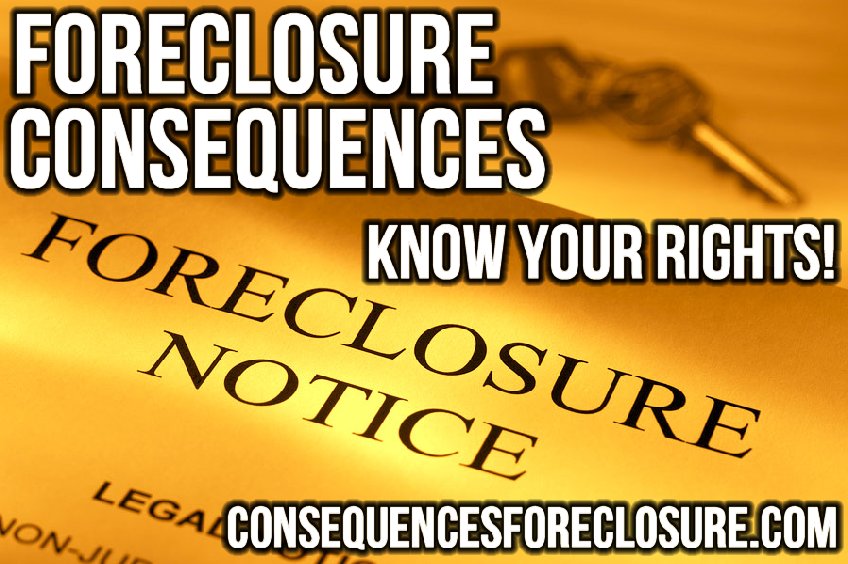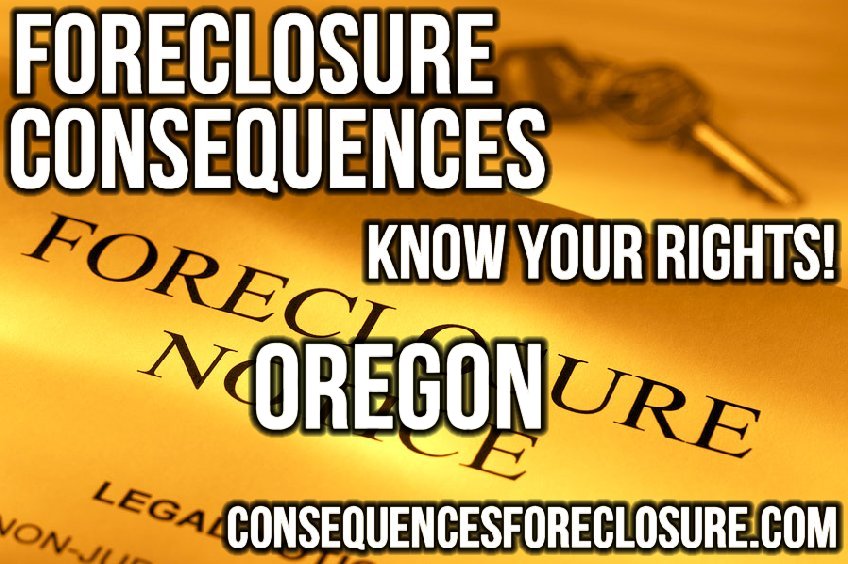 Foreclosure Consequences - Consequences of Foreclosure
Foreclosure Consequences - Consequences of Foreclosure
Foreclosure Consequences in Oregon - OR

Foreclosure Summary copyright, © ForeclosureLaw.org
Quick Facts
Judicial Foreclosure Available: Yes
Non-Judicial Foreclosure Available: Yes
Primary Security Instruments: Deed of Trust, Mortgage
Timeline: Typically 180 days
Right of Redemption: Yes
Deficiency Judgments Allowed: Yes
In Oregon, lenders may foreclose on deeds of trusts or mortgages in default using either a judicial or non-judicial foreclosure process.
Judicial Foreclosure
The judicial process of foreclosure, which involves filing a lawsuit to obtain a court order to foreclose, is used when no power of sale is present in the mortgage or deed of trust. Generally, after the court declares a foreclosure, your home will be auctioned off to the highest bidder.
In this type of foreclosure, the borrower may redeem the property by paying the purchase price, with interest, the foreclosure costs and the purchaser's expenses in operating and maintaining the property within 180 days after the date of sale. The borrower must file a notice no less than two (2) days and not more than thirty (30) with the sheriff to redeem.
Non-Judicial Foreclosure
The non-judicial process of foreclosure is used when a power of sale clause exists in a mortgage or deed of trust. A "power of sale" clause is the clause in a deed of trust or mortgage, in which the borrower pre-authorizes the sale of property to pay off the balance on a loan in the event of the their default. In deeds of trust or mortgages where a power of sale exists, the power given to the lender to sell the property may be executed by the lender or their representative, typically referred to as the trustee. Regulations for this type of foreclosure process are outlined below in the "Power of Sale Foreclosure Guidelines".
Power of Sale Foreclosure Guidelines
If the deed of trust or mortgage contains a power of sale clause and specifies the time, place and terms of sale, then the specified procedure must be followed. Otherwise, the non-judicial power of sale foreclosure is carried out as follows:
- A notice of default must be recorded in the county where the property is located and the borrower and/or occupant of the property must be served with a copy of the notice at least 120 days before the scheduled foreclosure sale date.
- A copy of the notice must be published once a week for four (4) successive weeks, with the last notice being published at least twenty (20) days prior to the foreclosure sale.
- Said notice must contain a property description, recording information on the trust deed, a description of the default, the sum owing on the loan, the lender's election to sell and the date, time and place of sale.
- The borrower may cure the default at any time prior to foreclosure by paying all past due amounts, plus costs.
- The sale must be at auction to the highest bidder for cash. Any person, except the trustee, may bid at the sale, which take place between 9:00 am and 4:00 pm at the location stated in the notice of record.
- The sale may be postponed for up to 180 days from the original sale date if at least twenty (20) days advance notice is given, by mail, to the original recipients of the notice.
A deficiency judgment cannot be obtained through a non-judicial foreclosure, but may be pursued when other foreclosure methods are used.
More information on Oregon foreclosure laws
Learn all about foreclosure consequences in Alabama: AL, foreclosure consequences in Alaska: AK, foreclosure consequences in Arizona: AZ, foreclosure consequences in Arkansas: AR, foreclosure consequences in California: CA, foreclosure consequences in Colorado: CO, foreclosure consequences in Connecticut: CT, foreclosure consequences in Delaware: DE, foreclosure consequences in Florida: FL, foreclosure consequences in Georgia: GA, foreclosure consequences in Hawaii: HI, foreclosure consequences in Idaho: ID, foreclosure consequences in Illinois: IL, foreclosure consequences in Indiana: IN, foreclosure consequences in Iowa: IA, foreclosure consequences in Kansas: KS, foreclosure consequences in Kentucky: KY, foreclosure consequences in Louisiana: LA, foreclosure consequences in Maine: ME, foreclosure consequences in Maryland: MD, foreclosure consequences in Massachusetts: MA, foreclosure consequences in Michigan: MI, foreclosure consequences in Minnesota: MN, foreclosure consequences in Mississippi: MS, foreclosure consequences in Missouri: MO, foreclosure consequences in Montana: MT, foreclosure consequences in Nebraska: NE, foreclosure consequences in Nevada: NV, foreclosure consequences in New Hampshire: NH, foreclosure consequences in New Jersey: NJ, foreclosure consequences in New Mexico: NM, foreclosure consequences in New York: NY, foreclosure consequences in North Carolina: NC, foreclosure consequences in North Dakota: ND, foreclosure consequences in Ohio: OH, foreclosure consequences in Oklahoma: OK, foreclosure consequences in Oregon: OR, foreclosure consequences in Pennsylvania: PA, foreclosure consequences in Rhode Island: RI, foreclosure consequences in South Carolina: SC, foreclosure consequences in South Dakota: SD, foreclosure consequences in Tennessee: TN, foreclosure consequences in Texas: TX, foreclosure consequences in Utah: UT, foreclosure consequences in Vermont: VT, foreclosure consequences in Virginia: VA, foreclosure consequences in Washington: WA, foreclosure consequences in Washington, DC; foreclosure consequences in West Virginia: WV, foreclosure consequences in Wisconsin: WI, foreclosure consequences in Wyoming: WY